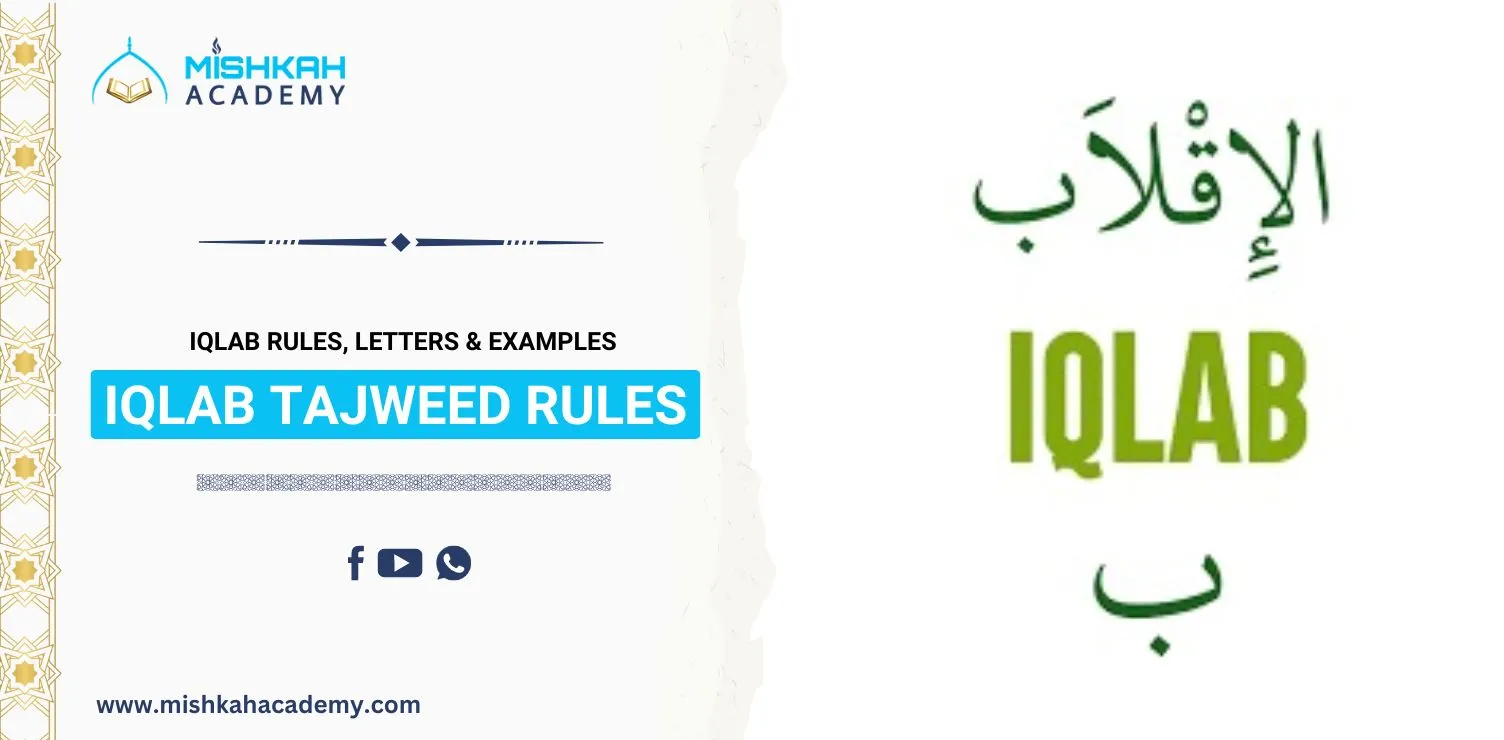Maintaining the holy message and the beauty of the Quran depends mostly on the skill of Tajweed, or correctly pronouncing the text. The rule of Iqlab is one of the many rules in Tajweed. It is one of the basic instructions for pronouncing Tanween (ً ٍ ٌ) and Nun Sakinah (نْ). This page will define Iqlab, go over its guidelines, and offer Quranic examples. You should know a good deal about what Iqlab in Tajweed is, how it’s used, and why it matters to recite quran beautifully.
What is Iqlab Meaning in Tajweed?
Table of Contents
Toggle“To turn” or “to change” is the Arabic root “قلب,” which is where the name Iqlab (إقلاب) comes from. The term “Iqlab” in Tajweed describes how the letter Ba (ب) can cause the Nun Sakinah (نْ) or Tanween to change into a Meem (م) sound. Arabic phonetics promotes gentler transitions between sounds, therefore this change is made to enable a seamless recitation and to make pronunciation easier. Learn more about this in our Online Tajweed course to enhance your recitation skills.
Understanding Iqlab Rules
Learning the proper application of Iqlab in Quran recitation needs mastery of specific rules. The following are the basic Iqlab rules:
1. Requirements for Iqlab
When Tanween (نْ) or Nun Sakinah (نْ) appear before the letter Ba (ب), it results in Iqlab. This means that the Iqlab rule will be used whenever you see نْ or a Tanween that is immediately followed by ب.
2. Changes in Sound
The Meem (م) sound replaces the Nun Sakinah or Tanween in Iqlab. Ghunnah, a long, mild nasalization lasting two counts, is the nasal sound that goes along with this transition.
3. The Role of Ghunnah
Nasalization, or ghunnah, is a key component of using Iqlab. When pronouncing the letter Meem, the reader must make a nasal sound and hold it for two counts or beats before moving on to the letter Ba. This sure that the recitation flows smoothly.
4. Letters of Iqlab
Iqlab can only be caused by the letter ب (Ba). Iqlab is limited to the letter ب, in contrast to other Tajweed rules that could involve several letters. Because it only arises in one particular case, Iqlab is therefore one of the most simple rules of Tajweed.
5. The Quranic symbol for Iqlab is
A little Meem (م) is frequently found above the Nun or Tanween in the printed Quran, the Mushaf, to signify that the rule of Iqlab should be followed. Readers can use this as a guide to choose a suitable spot for the sound transformation.
Note: Enrolling in the Advance Tajweed course is best to learn all tajweed quran reading rules properly with expert guidance.
Start Your Quran Journey NowExamples of Iqlab in the Quran
There are many examples of the rule of Iqlab being carried out throughout the Quran. Here are a few important examples:
Example of Al-Baqarah Surah (2:19)
Word: سميعٌ بصيرٌ
Explanation: In this verse, the letter ب in بصيرٌ comes after the Tanween (ٌ) on the word سميعٌ. Iqlab norms state that before moving on to the ب, the Tanween must first undergo nasalization (Ghunnah) to become a Meem sound.
Example of Yaseen Surah (36:9)
Word: أُن بُورِكَ
Explanation: In بُورِكَ, the letter ب (Ba) comes after the Nun Sakinah (نْ) in أَن. Here, the application of Iqlab causes the Nun to nasalize and convert into a Meem sound.
Example of Al-Anfal Surah (8:42)
Word: أَن يُبْلِيَ
Explanation: The letter ب in يُبْلِيَ comes before the Nun Sakinah (نْ) in أَن. The Meem sound is used in place of the Nun sound, and then the ب . is spoken by nasalizing it.
Example of Al-Baqarah Surah (2:25)
Word: مِن بَعْدِ
In this instance, the letter ب in بَعْدِ comes before the Nun Sakinah in مِن. As a result, before the ب is spoken, the Nun is transformed into a Meem with Ghunnah.
Examples Of Iqlab in Two Words
كَأَن لَّمْ تَكُن بَيْنَكُمْ وَبَيْنَهُ مَوَدَّةٌ
It can be read as:
“ka’an lam takum baynakum wa baynahu mawaddah”
يَخْرُجُ مِن بَيْنِ الصُّلْبِ وَالتَّرَائِبِ
It can be read as:
“yakhruju mim bayni alssulbi wa alttara’ibi”
وَاللَّهُ عَلِيمٌ بِذَاتِ الصُّدُورِ
It can be read as:
“wallahu ‘aleemum bi dhati alssuduri”
وَمِن بَيْنِنَا وَبَيْنِكَ حِجَابٌ
It can be read as:
“wamim baynina wa baynika hijabun”
How to Use Iqlab for Reciting the Quran?
A careful technique needs to be used to correctly use the Iqlab norm, ensuring that the recitation is seamless and follows the Tajweed guidelines.
1. Identify the Tanween or Sakinah Nun
When you read the Quran, start by looking for references to Nun Sakinah (نْ) or Tanween (ً ٍ ٌ).
2. Look for the letter “Ba”
Once a Nun Sakinah or Tanween has been identified, see if the letter Ba (ب) follows right away. If so, the Iqlab rule is applicable.
3. From the Sound
Make the Meem sound while saying the Nun or Tanween, rather than the way they appear. Ensure that the sound is produced for two counts or beats using Ghunnah (nasalization).
4. Continue Calmly
In order to keep the recitation flowing naturally, pronounce the Meem with Ghunnah and then transition smoothly into the letter Ba.
Iqlab-Related Tajweed Rules
Although Ahkam an-Noon As-Sakinah wal Tanween (the rules governing Nun Sakinah and Tanween) is a more complete set of laws, Iqlab is a specific rule related to Nun Sakinah and Tanween.
Among these guidelines are:
Izhar: Speaking clearly and unaffectedly when pronouncing Nun Sakinah or Tanween after the throat letters (ء, هـ, ع, ح, غ, خ).
Idgham: combining the Nun Sakinah or Tanween into the next letter when specific letters such as (ي, ر, م, ل, ن, و). are followed.
Ikhfa: When pronouncing the Nun Sakinah or Tanween, use a mild nasal sound (ت, ث, ج, د, ذ, ز, س, ش, ص, ض, ط, ظ, ف, ق, ك). in front of some letters.
Depending on the letter that follows, each of these guidelines specifies how Nun Sakinah and Tanween should be pronounced. Iqlab is special because it only works when the letter Ba comes next, which makes the sound change to a Meem.
Conclusion
The rule of Iqlab is a foundation of Tajweed that guarantees that Nun Sakinah and Tanween are pronounced correctly when the letter Ba is placed after them. Iqlab makes reciting the Quran easier while maintaining its phonetic beauty by using Ghunnah to change the Nun or Tanween into a Meem sound.
To enhance one’s ability to recite the Quran, becoming competent in Iqlab is vital. When Iqlab is used correctly, it strengthens the spiritual bond with the Quran while maintaining the text’s meaning. Tajweed is a tool for refining your recitation and getting you closer to Allah’s verses, so keep that in mind as you practice. Learn more through Mishkah Academy Online Quran Recitation Course to master Iqlab and other essential rules of recitation.






